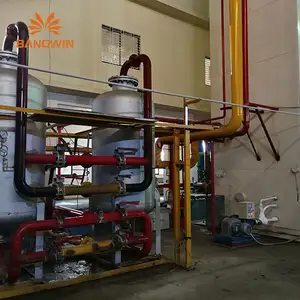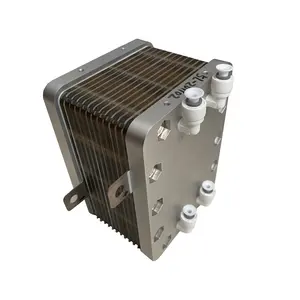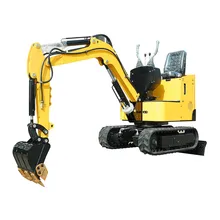What is Hydrogen Generator Technology
Hydrogen generators are innovative devices that produce hydrogen gas on-demand through the process of electrolysis, in which water is split into its constituent parts hydrogen and oxygen. This technology is particularly attractive for various applications, including the production of clean-burning fuel for transportation, power generation, and as a feedstock for fuel cells. Hydrogen generators are designed for a range of users, from individual consumers looking for a clean fuel source to large industries seeking to integrate hydrogen into their manufacturing processes.
The principle behind a hydrogen generator is relatively straightforward. It utilizes electrical energy to split water into hydrogen and oxygen. This can be achieved through several methods, but all involve passing an electric current through water to cause a chemical reaction that separates the hydrogen and oxygen. The generators are equipped with an electrolysis cell, typically containing two electrodes (an anode and a cathode), immersed in water. When a voltage is applied across the electrodes, water is oxidized at the anode, releasing oxygen. Simultaneously, hydrogen is produced at the cathode. The generated hydrogen can be stored and used later as a fuel source for heating or to power fuel cells that generate electricity.
Hydrogen generators are gaining traction due to their potential environmental benefits and cost-effectiveness compared to traditional methods of hydrogen production. They offer a flexible and reliable source of hydrogen, which can be produced on-site or off-site depending on the user's needs. As the world seeks cleaner and more sustainable energy solutions, hydrogen generators represent a promising technology that can support these efforts across various sectors.
Types of Hydrogen Generator Technology
Hygennerators come in various forms, each with specific attributes and applications. The alkaline water electrolysis method is one of the most common types, where water is split into hydrogen and oxygen using an electric current. This method is widely used for its simplicity and effectiveness in generating hydrogen gas.
Another type is the PEM (Proton Exchange Membrane) electrolyzer, which uses a membrane to separate hydrogen from oxygen. This technology is known for its high purity hydrogen production and is often employed in applications that require high-quality hydrogen.
For those seeking an eco-friendlier option, there are solar-powered hydrogen generators that harness energy from sunlight to split water. These are particularly useful in remote locations where electricity is not readily available.
The chemical reaction between aluminum and water produces hydrogen gas and is used in small-scale applications like demonstrations or educational kits. This method can be seen in action in simple hydroelectric generators that use aluminum-air reactions to produce hydrogen.
Lastly, hydrocarbon steam reforming is a common method used in industrial settings. This process involves reacting a mixture of hydrocarbons with steam and results in a hydrogen-rich gas. It's often used for applications requiring larger quantities of hydrogen such as ammonia production or oil refining.
Each type has its own set of attributes that cater to different use cases from small-scale household needs to large industrial requirements.
How to choose Hydrogen Generator Technology
Selecting the right hydrogen generator technology requires careful consideration of several factors to ensure it meets the needs of your business or application. Here are some key points for businesses to consider:
-
Production Capacity: Determine the quantity of hydrogen needed for your operations or resale. Electrolysis generators are better suited for larger-scale production needs, whereas chemical processes may be more cost-effective for smaller quantities.
-
Efficiency: Choose a generator with high energy conversion efficiency to maximize your available resources. While initial costs may be higher, long-term savings can be significant.
-
Storage and Safety: Consider how the generator stores hydrogen as well as safety features like automatic shutdowns and leak detection systems to prevent accidents in your workspace.
-
Integration with Existing Systems: Assess whether the generator can easily integrate with your current infrastructure or if additional investments are needed for system upgrades.
-
Environmental Conditions: Take into account the environmental conditions where the generator will operate. Some technologies may be more resilient in certain climates or settings.
By carefully evaluating these points against your business requirements, you can make an informed decision that aligns with your operational needs and budgetary constraints.
About Hydrogen Generator Technology on Alibaba.com
Alibaba.com stands as an expansive marketplace connecting businesses with a vast array of hydrogen generator technology suppliers from around the globe. The platform's comprehensive approach caters not only to large-scale industrial applications but also offers solutions suitable for smaller businesses seeking specialized equipment. With an extensive selection of hydrogen generator technologies listed under various categories such as electrolytic cells, fuel reformers, and portable models tailored for on-the-go use, Alibaba.com simplifies the procurement process by providing detailed product descriptions along with supplier profiles to aid in making informed decisions.
Businesses looking for specific types of hydrogen generator technologies will find Alibaba.com's global reach particularly valuable. Whether you require high-pressure models for industrial settings or portable units for commercial use or outdoor activities, Alibaba.com facilitates sourcing from suppliers who meet your operational needs. Additionally, services like Trade Assurance provide peace of mind by protecting payments until delivery is confirmed satisfactory.
Alibaba.com is not just a platform for product discovery but also a hub that supports businesses throughout their purchasing journey with features such as mobile accessibility and multilingual communication options. This commitment to seamless transactions reinforces Alibaba.com's position as a leading site for B2B sales across diverse industries while emphasizing its dedication to fostering growth opportunities for small and medium-sized enterprises worldwide.
Common FAQs for Hydrogen Generator Technology
What is a hydrogen generator?
A hydrogen generator is a device that converts water into hydrogen gas (H2) through an electrolytic process called electrolysis. It is used in various applications including welding, metal cutting, and as fuel for fuel cells.
How does a hydrogen generator work?
A hydrogen generator uses an electrolytic process to split water into hydrogen and oxygen. This is achieved by running an electric current through water, which causes the water molecule to separate into its constituent parts.
What industries commonly use hydrogen generators?
Hydrogen generators are widely used in industries such as metallurgy, electronics manufacturing, food and beverage production, pharmaceuticals, and for fuel cell technology.
What should I consider when choosing a hydrogen generator for my business?
When selecting a hydrogen generator, consider the purity level of the produced hydrogen, the generator's efficiency, its durability for your specific application, and the availability of after-sales services that could be important for maintenance and repair.
Can a hydrogen generator be used in vehicles or mobile equipment?
Yes, hydrogen generators can be used in vehicles and mobile equipment that operate on alternative fuel. They are often used in internal combustion engines or as part of fuel cell systems.
Are there different types of hydrogen generators?
Yes, there are different types of hydrogen generators including alkaline water electrolyzers, compressed hydrogen generators, and PEM water electrolyzers. Each type has specific applications based on its mechanism of hydrogen production.
How do I maintain a hydrogen generator?
Maintenance for a hydrogen generator typically includes regular checks for leaks, ensuring that the water supply is clean and free from impurities, and that the electrolytic cell is functioning properly.
What are the safety concerns associated with using a hydrogen generator?
Hydrogen generators use electrolysis which involves handling water and electricity. It is essential to follow manufacturer guidelines and local regulations when operating a hydrogen generator to mitigate any potential safety risks.
Is it possible to integrate a hydrogen generator with an existing fuel cell system?
Yes, some hydrogen generators can be integrated with fuel cell systems or used as a back-up power source, provided they meet the specific requirements of the fuel cell technology in question.
Do I need a special kind of water to use in a hydrogen generator?
It is recommended to use deionized water to ensure the longevity and performance of the hydrogen generator. Using tap water can lead to mineral buildup that can affect its efficiency.
How long does a hydrogen generator last?
The lifespan of a hydrogen generator depends on the quality of materials used and how frequently it is used. With proper maintenance, some generators can last several years before requiring replacement parts.
Can I customize a hydrogen generator based on my business needs?
Customization options may be available from certain suppliers. It is best to discuss your specific requirements directly with suppliers to understand the possibilities and limitations of customizations.



























 浙公网安备 33010002000092号
浙公网安备 33010002000092号 浙B2-20120091-4
浙B2-20120091-4